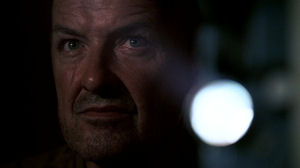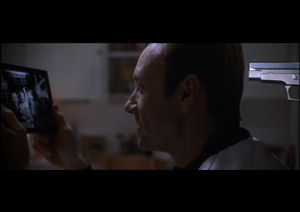The Science of Spoilers: Why Knowing the End Won't Ruin the Story
 | | My mother, give or take a few details |
My mother loves mysteries. Her nighttime companions are the likes of James Patterson, Clive Cussler, Robert Ludlum, Jeffery Deaver, Jack Higgins, and Catherine Coulter, all of whom she tends to read while simultaneously watching reruns of CSI and Criminal Minds. Her favorite cartoon is Scooby Doo; she educated me to love Hitchcock and Poirot; she married a certified member of the Baker Street Irregulars; and God help you if she senses there might be something wrong with you and you won't tell her what it is. As a professional medical diagnostician, she relishes in solving puzzles and is remarkably good at doing it. My brother took her to see The Sixth Sense when it was still in theaters and was dumbfounded when she saw right through the narrative twist within the movie's first five minutes. This is why it has always surprised me--from the time I was barely able to read--when she frequently turns to the last page of a mystery novel before getting very far into it.
Science, it seems, has finally given me an answer to this strange phenomenon. A study to be published in Psychological Science suggests that spoilers don't spoil stories and that knowing how a story will end can even increase the enjoyment people get from it. At UC San Diego's psychology department, Jonathan Leavitt and Nicholas Christenfeld conducted three experiments in which they made students read several classic stories that rely on ironic twists or tense mystery. Sometimes, the stories were presented completely as-is, and at other times, they were preceded by an explanatory paragraph that revealed (albeit subtly) the twist or solution. When surveyed after reading the stories, those who were spoiled reported having more enjoyment from the experience than those who were not spoiled.
 | | He wouldn't have freaked out if he'd checked the Internet before heading to Bespin |
Though the study itself doesn't offer any reasons for the results, it hasn't stopped Leavitt and Christenfeld from offering their opinions. Christenfeld, a professor of social psychology, argues, "Plots are just excuses for great writing. What the plot is is almost irrelevant. The pleasure is in the writing." Leavitt, a psychology doctorate student, says, "It could be that once you know how [a story] turns out, it's cognitively easier--you're more comfortable processing the information--and can focus on a deeper understanding of the story." The pair conclude their paper with the thought that "intuitions about suspense may be...wrong."
This jives with my mother's many explanations for prematurely flipping to the last page of a novel she's never read before. It's not that she's impatient, but she relishes being able to appreciate the clues, macguffins, and red herrings for what they are, something that isn't always possible when you don't know the solution. She claims that doing this has made her better at intuiting solutions to other mysteries, both real and fictional. Not only can she school me, a fiction writer, on the ins and outs of narrative trickery, but she is a better diagnostician for it, because she can more easily recognize whether a medical symptom is a valuable clue or an irrelevant oddity. It's easy to dismiss this as her own arrogance, until you get sick. Besides, nobody who knows my mother would ever describe her as arrogant.
As a side note, I would be remiss if I didn't mention that she doesn't always turn to the last page of every book she reads. In fact, I haven't seen her do it in years, and she tells me she only does it nowadays when she is forced to put a book down and knows she won't be able to get back to it quickly.
Of course, my mother's not the only person in the world who does this. There are tons of people out there who don't mind getting spoiled. The hordes of people sharing spoilers online should be evidence enough that they are popular among a certain segment of the populace, but the people out there who scream bloody murder when they come across a spoiler without the requisite warning show that there are people out there who mind. I tend to think of myself as one of them.
 | | Some people never get to see how it ends |
When ABC's Lost was on the air, for example, I had a love/hate relationship with the Internet. Lost, more than any other television show, had (and still has) an enormous online fanbase, replete with many forums, podcast channels, and incredibly detailed wiki sites (I challenge you to find another television show with a wiki as thorough as Lostpedia). One of my favorite Lost podcasts, The Transmission, involves an endearing couple, Ryan and Jen, who live in Hawaii. When the show was still filming, they devoted a section of each podcast ("The Forward Cabin") to reports around Hawaii of the cast and crew during production. These reports, naturally, were loaded with spoilers. Since Lost thrives on mystery and confusion, you'd imagine that these spoilers would ruin the show for anybody who listened to them, and yet, people continued to listen to them.
There were times during the show's run when I didn't avoid spoilers. I was not surprised, for example, when Ana Lucia shot Shannon during the show's second season. (Should I have given a spoiler warning?) However, there were other times where I ran screaming from spoilers, my fingers in my ears while I chanted "lalalala" at the top of my lungs. None of the show's biggest twists--the season enders--were ever spoiled for me. Looking back on it, I can't honestly say which method was better, though if you asked me at the time, I would have told you that spoilers are the embodiment of evil.
In the light of this study, I've thought back to some of my favorite classic films, like Psycho, Soylent Green, and The Planet of the Apes. In my estimation, these are some of the greatest films ever made, and I would gladly pop any of them in my DVD player right now to watch them for the hundredth time. What's more, I know that, when I saw them for the first time, I had been spoiled. (The big twist to The Planet of the Apes is on the DVD cover, for crying out loud.) Did knowing the rather surprising twists in these films affect my enjoyment of them? The evidence seems to point to no.
 | | Half of all spoilers involve Kevin Spacey; there is only one solution |
Then again, I think of slightly more recent twisty films, like Fight Club, The Usual Suspects, or Seven. In these cases, I was thrilled that I didn't see the twists coming. While watching Fight Club and The Usual Suspects, I didn't even realize I was supposed to be expecting a twist. I love the feeling of being surprised by a story, and not knowing where these movies were going had an impact on my first impression of them. Still, what's the first thing you want to do when you watch a movie like that? To quote Lost's John Locke, "We're gonna need to watch that again." The second time is better than the first, because when you know what to look for, you catch all those things you didn't notice the first time around.
This is also how people can watch the same movie (or procedural television show) over and over again, or how they can watch a movie like Titanic when they know how it's going to end. It's counter to what we like to think about the nature of suspense and mystery, but it makes sense. Though I've never read the last page first, I've read many a novel that begins with a flashforward to the climax. There are many great movies that do it too, like American Beauty, in which the narrator tells you right at the beginning that the story is going to end with his death.
I would not try to argue against spoiler warnings (that would be suicidal on the Internet these days), but it might behoove all of us to relax a little, to not stress so much about it. This study has given me a lot to think about, but it hasn't changed my desire to experience a fresh plot twist the way the writer wants me to experience it. Though I won't be turning to the last page of a mystery novel any time soon, I can better appreciate why my mother does it. She, like most of us, doesn't have the time or energy to read the same book multiple times, and if she knows she can only experience a story once, she wants to maximize her enjoyment of it by knowing where it will ultimately go. Perhaps there's nothing wrong with that, after all.
-e. magill 8/23/2011
|
|